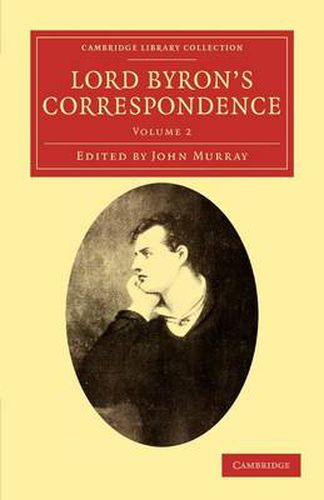Readings Newsletter
Become a Readings Member to make your shopping experience even easier.
Sign in or sign up for free!
You’re not far away from qualifying for FREE standard shipping within Australia
You’ve qualified for FREE standard shipping within Australia
The cart is loading…






A leading figure in Romanticism and a political campaigner committed to social reform, Lord Byron (1788-1824) is regarded as one of the greatest of British poets. First published in 1922, this two-volume work is a compilation of letters Byron wrote between 1808 and 1824 to some of his close friends, including Lady Melbourne, John Cam Hobhouse, a fellow-student at Cambridge, and Percy Bysshe Shelley. The introduction and biographical notes by the publisher John Murray IV (1851-1928), grandson of Byron’s own publisher John Murray II, supplement the letters and restore their narrative thread. Volume 2 features the letters Byron wrote from 1816 until his death. It focuses on Byron’s exile in Italy and his involvement in the Greek independence movement. Three appendices provide additional perspectives, and include letters from Anne Isabella Milbanke (to whom Byron was briefly married), and his rejected lover Lady Caroline Lamb.
$9.00 standard shipping within Australia
FREE standard shipping within Australia for orders over $100.00
Express & International shipping calculated at checkout
A leading figure in Romanticism and a political campaigner committed to social reform, Lord Byron (1788-1824) is regarded as one of the greatest of British poets. First published in 1922, this two-volume work is a compilation of letters Byron wrote between 1808 and 1824 to some of his close friends, including Lady Melbourne, John Cam Hobhouse, a fellow-student at Cambridge, and Percy Bysshe Shelley. The introduction and biographical notes by the publisher John Murray IV (1851-1928), grandson of Byron’s own publisher John Murray II, supplement the letters and restore their narrative thread. Volume 2 features the letters Byron wrote from 1816 until his death. It focuses on Byron’s exile in Italy and his involvement in the Greek independence movement. Three appendices provide additional perspectives, and include letters from Anne Isabella Milbanke (to whom Byron was briefly married), and his rejected lover Lady Caroline Lamb.